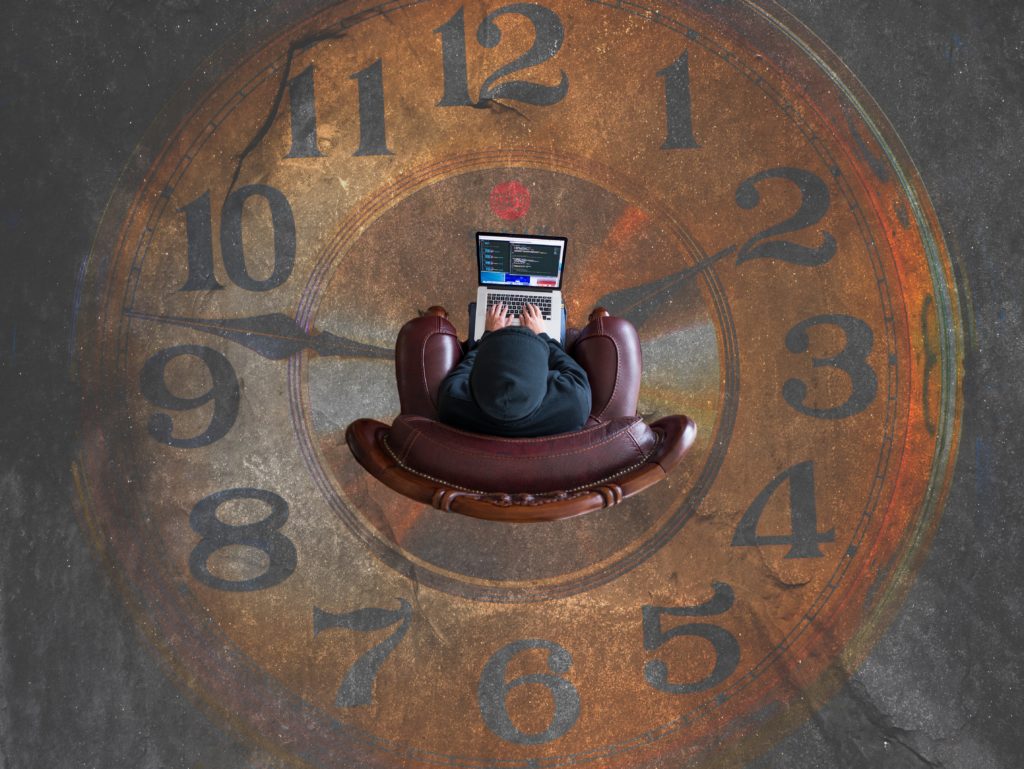Editor’s Note: Today’s post is by Gabe Harp. Gabe leads the Digital Products & Software Services team at the MIT Press, where he is neck-deep in digital books, journals, open access, and exploring new ways of working. Before joining the MIT Press he spent many years with Cell Press / Elsevier. He will be joining the Society for Scholarly Publishing Board of Directors as of the 2020-2021 term.
Having worked from home in multiple locations, ranging from the wilds of western Massachusetts to the coast of Maine, and in a variety of roles for different organizations, I recently decided to distill my key recommendations. These tips are focused on working from home during this pandemic and are based on my own experience; not every point will suit every person. Guidance abounds these days, including recent Scholarly Kitchen pieces, but my hope here is that readers of this short post will each glean at least one nugget to help them through this pandemic.

Be Patient with Yourself
These are not normal times. Be realistic about the time you have and what you can achieve. Ask only what is reasonable of yourself, and share that with others – friends, family, co-workers. If you can no longer make that 9am recurring meeting, let your colleagues know. If you need to more aggressively carve out meeting-free (and interruption-free) time to spend on focused tasks, give yourself permission to do so.
Be Patient with Others
Offer the same consideration to others. Understand that everybody experiences and responds to a crisis differently. Be especially mindful of the needs of others. Let those you interact with know that you are there to support them.
Spin up a Signaling System
Devise a system that will let your household members know that you are not to be disturbed. This can range from a dedicated light – think of the red light in a recording studio – to something as simple as a “busy” sign. I use a curtain: when it is closed, I need to focus; when it is open, interruptions are welcome. Be creative and figure out what works best for you. And regardless of your signal, accept the fact that you will sometimes be disturbed anyway.
Be realistic about the time you have and what you can achieve.
Concoct a Commute
Creating distance between your workday and your personal life can be immensely helpful. The mind needs time to adjust, decompress, and switch gears. This might not be possible for everyone, but try to build in a buffer where you can: a walk around the block, five minutes of meditation, an episode of your favorite television rerun. For more on this topic, see Charlie Rapple’s recent piece.
Dress for Work
To put yourself in the right frame of mind, dress as you normally would for working in the office. That will vary from person to person and company to company. For me, it might be my lucky blazer; for the next person, it might be a hoodie. It is about what suits you best.
Stand When You Can
Here I will add just one ergonomic tip here: strive for a mixture between sitting and standing. After many years at home, I finally invested in a workstation with an adjustable height. My approach is to sit for focused work and to stand for meetings. And if you find the need to incorporate movement, give it a shot. I had my first “walking” meeting last week. And I have discovered that I do some of my best thinking on a bicycle; now, I will head out for a ride if time permits and I know that I have a challenging problem to think through.
Shorten Your Meetings
This is my favorite and most earnest piece of advice: try trimming 15 minutes from all meetings, whether recurring ones or those you are scheduling anew. You will often find that those “extra” 15 minutes weren’t needed, and your colleagues will greatly appreciate the time savings. In addition, solicit feedback about how a given meeting structure is working and whether adjustments can be made to increase its efficacy. Lastly, even when you are not the host, don’t be shy about suggesting that a meeting could be shortened.
Craft Your Own Rituals
Perhaps most importantly, you need to find what works best for you. These are difficult and unprecedented times for everyone, and they might well continue for 18 months or more. Recognize that we need to continually adjust, experiment, explore, and find what will help us all stay healthy and well.
Closing Note
As I write these thoughts, I am reminded of how lucky and privileged I am to have stable employment, a supportive organization, reliable internet, good health, healthcare, and more. I fully recognize that much of the world’s population does not have these privileges, and that many people will lack the opportunity to even put into practice the points of advice that I have shared above.
Discussion
15 Thoughts on "Guest Post — On Working from Home in a Pandemic"
I’ve seen many of such guidelines in mainstream journals about how to work efficiently at home. All are certainly fine, like those mentioned by Gabe Harp. However, from my perspective, this remains a paper exercise if the very-top-key-recommendation is not clearly stated, since it turns out that it’s the most challenging to follow:
1. Work.
Brilliant suggestions, Gabe! I especially like “Concoct a Commute.” Both the ritual and the fresh air and movement are so important. Thank you.
The closing note is really” à propos” .Not everybody has a secure job or all the other perks most of us have.We should be thankful and , if possible, help those who are not as lucky as some of us are .Thank you for a nice post
Thanks, Samir. I agree. I am feeling very grateful for what I have and am trying to give back where I can. All the best.
While I am retired, and not working at home, I do spend an inordinate amount of time on my computer. Gabe’s suggestions will work for me (except for the bicycle ride– as I gave that up a long time ago). Wise and thoughtful…Thanks, Gabe!
I’ve worked at home for almost as many years as I’ve worked in an office. Here’s what I learned. (1) I need to put on clean clothes and wear actual shoes shoes to feel like I’m at work. (2) Structure breakfast and lunch away from your work area and get in a walk around the block, just to wrap up the time in your mind. As Gabe says, have an end of the workday ritual and if there’s an office door, close it. (3) Call a few people on the phone every day so you don’t feel so isolated. A quick call in place of an email isn’t going to damage your reputation.
All that said, I have found it harder to concentrate some days during the pandemic work from home. This is the first time in my career that working from home has been due to a very real threat, rather than physical distance from HQ. Don’t be too hard on yourself or your co-workers if the ambient stress gets to you.
I hope most employers are as reasonable and evidence-based as mine and don’t require folks to come back to the office until the physical spaces can be configured with appropriate social distancing rules in place.
Hi Paula, thanks for sharing! I especially like your suggestion of “a quick call in place of an email.” I have also observed some colleagues begin to use the telephone instead of virtual tools for select meetings, as a way to combat the phenomenon known as “Zoom fatigue.”
Something I would add is to make sure you have a community of people with whom you have a chat relationship and can use as sounding boards. That dynamic is important for enhancing productivity and preventing isolation.
Hi Susan, I agree — community is critical, and we are all finding new ways to reshape our communities. At the MIT Press, for instance, we have seen a huge uptick in our use of Slack, and I suspect that this and similar tools are replacing some of the typical in-office staples such as water-cooler conversations and dropping by someone’s office, desk, or cubical.
So clear and helpful, Gabe, like a steam release on a teakettle! Thank you.
Love this, thanks Gabe.
Thanks for posting, Gabe. Though you don’t overtly address, implied throughout is the family piece. Those of us with young children at home face a different set of challenges during this forced remote work situation. Your first two notes are particularly prescient when dealing with the unexpected (or should that be “expected”) distractions of home schooling and quarantining. As much as we may miss our colleagues in the office, our kids are missing their peer groups so much more and are facing a confusing world turned upside down by a not-completely-understood “pandemic” (a word they do not completely understand either). Recognizing that there are times when the pressing concerns of your children will trump presentation deadlines and Zoom meetings is essential to maintaining sanity – for both you and your children.
Great post, Gabe! I shared it with my department as so many of us haven’t worked from home on a regular bassis in the past. You had several suggestions that I hadn’t heard previously. I also liked the concoct a commute recommendation. Thanks for sharing these.
I particularly appreciate the comment about dressing for work as you normally would. I started off dressing in shorts and tee-shirts for working at home, but I soon discovered that my energy level and my attitude were at an all-time low. I decided I needed to dress for work & take periodic breaks. It made a huge difference – in my wellness & my work!
Great tips!
I have one to add, for folks like me who work from home (I do it all the time, but now the rest of the family is doing it too…) in small spaces: when you don’t have a *space* you can fully dedicate to work, with or without a door, clear *time* separations become critically important. I’m lucky enough to have a dog, so I use dog walks to help define my workday: the first walk happens before work, the second is my lunch break. At the end of my work day, I pack up my laptop and other office materials and the kitchen table magically stops being my desk 🙂



